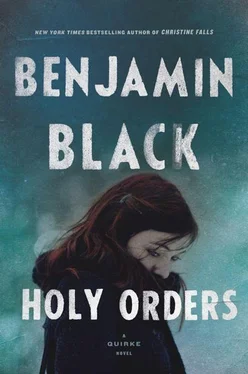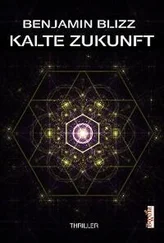Packie Joyce spoke to the woman, and she said something back. This exchange too Quirke could not understand. The woman drew in her head, and a moment later appeared again, with a shawl of faded tartan draped over one shoulder. She opened the bottom half of the door and leapt down lightly to the ground. She wore a loose red skirt, and was barefoot, with black dirt lodged under her toenails. Behind her, a second figure appeared in the doorway, a girl of twelve or thirteen, ethereally pale and thin, in a dirty, sleeveless gray dress that was too big for her, and that hung on her crookedly, like a sack. The woman turned and spoke to her sharply, and she descended listlessly from the caravan, keeping her eyes downcast. Her lank, ash-colored hair was braided in a long, polished plait at the back. There was a suppurating cold sore on her lip. The woman put an arm around her shoulders and, ignoring Hackett, gave Quirke a last and seemingly scathing glance and sauntered off, tossing that long train of night-black hair behind her. The child too looked back at him, and something in her eyes made him almost shiver. They seemed to him eyes that had seen many things, things a child should not see.
The other caravans in the circle seemed to be empty, or if they were not their inhabitants were unnaturally quiet. Perhaps they had witnessed the strangers arriving and had withdrawn into hiding, out of which they were watching now, silent and unseen. Under one of the caravans Quirke spied a dog, a strange feral-looking beast with narrow flanks and a wolf’s sharp muzzle. It had captured something — what was it, a rabbit, or a cat, even? — and had it pinned to the ground on its back and was devouring its innards, stabbing those wedge-shaped jaws into the torn-open stomach and pulling out long, glistening strings of purplish gut and gobbets of plum-colored inner organs. The creature that was being eaten, whatever it was, seemed, impossibly, to be alive still, for its upflung limbs waved helplessly and its black paws twitched. Quirke looked away. Hackett had turned to him with an inquiring glance, but he only shook his head.
Packie Joyce had pushed open the lower half of the caravan door, and now he put up two hands and grasped the doorjambs at either side and with surprising agility for a man of such bulk hoisted himself up and in through the doorway. He turned back and threw down an old tin bucket. “Step on that, lads,” he said. “I’d not want you to break a limb and be sending the sheriff out to haul me before a court of law on a charge of criminal neglect.”
Quirke, moving forward, could not resist a glance back at the ravening dog. Bewilderingly, it was different now, was no longer wolflike; in fact it was merely, as he saw, a half-starved whippet or a stunted greyhound, and what it was gnawing at was not another animal but only a bone, meatless and streaked with mud. Feeling Quirke’s eye on it the dog cringed away, moving backwards and dragging the bone along with it. Quirke passed a hand over his face. He could feel himself beginning to sweat.
Hackett set the bucket upturned on the ground and clambered onto it, with difficulty — Quirke had to give him a push in the small of the back; getting him up and through the doorway was like trying to stuff a pillow into a too-small pillowcase — and then Quirke followed, grunting from the effort.
Inside, the caravan was unexpectedly spacious, even though the three of them, Packie the Pike especially, could stand only at a stoop. There were two long, low beds, one on each side, hardly wider than benches, with a small wooden cupboard set between them. Inside the door, on the right-hand side, there was a potbellied stove with a crooked and slightly comical tin chimney sticking up through a hole in the roof. Under the lid of the cupboard was a panel of wood that could be pulled out to make a sort of table, and Packie pulled it out now, and bade his two visitors to sit.
They sat down on the beds, facing each other, their knees almost touching. A vague image, the merest wisp, stirred in the farthest reaches of Quirke’s memory. He seemed to see himself as a child of four or five, playing house together with a little girl of the same age, she pretending to be Mammy and pouring imaginary tea for him out of a jam jar. The memory, if memory it was, startled and unsettled him. Where in the wilderness of his lost and solitary childhood could he have taken part in such a game? Again he put up a hand and this time briefly covered his eyes. He had once more that sense of having split into two, of being himself and at the same time some other, alien to himself and yet somehow not unknown.
Packie the Pike knelt on one knee and rummaged inside the cupboard and brought out a milk bottle stoppered tightly with a wadded twist of paper. “You’ll have a sringan , lads, aye?” Packie said, holding up the bottle. It was three-quarters full of a clear, silvery, and slightly clouded stuff.
Quirke eyed the bottle, passing the tip of his tongue over his lower lip. Oh, yes, yes indeed, he would have a drink. The liquor in the bottle was the same color as the light coming in at the windows at either end of the caravan.
Packie delved again in the cupboard and this time brought out three small, bulbous glasses with thick rims and set them on the makeshift table. In fact, as Quirke quickly saw, they were not glasses, but glass jars of the kind that potted meat came in, adapted to a new use. Packie poured a generous measure from the milk bottle into each of them, and handed one to Hackett and another to Quirke. Hackett held the liquor aloft and peered at it with a narrowed eye. “Is this what I think it is, Mr. Joyce?” he asked.
Packie looked down at him in wide-eyed innocence, a huge, jovial, and dangerous man smelling of burnt rubber and immemorial dirt. “This,” he said, “I call the Honey of the West. It was sent to me by a cousin of mine in Connemara, the Jinnet Joyce, a fine upstanding man and a great distiller of the potato.”
“You know it’s against the law to be in possession of illicit liquor,” Hackett said.
“Wisha, man, don’t take the good out of it! You’re on my territory now — let’s have none of that old talk about what’s legal and what’s not. Drink up now and don’t be shy.”
Quirke drank. The poteen washed against the back of his palate, a liquid flame. The taste, or lack of it, reminded him of surgical spirit, a clandestine nip or two of which he would take sometimes of a morning when the tasks and trials of the day ahead seemed particularly daunting. He felt straightaway the alcohol sliding into his veins; it was like the welcome return of an old and happily disreputable friend.
Hackett set his drink down on the table and smacked his lips. “That’s fine stuff, right enough, I’ll give you that, Packie,” he said. “Of course”—he shot Packie a meaning look—“I’m only sampling it in the line of duty, you understand, and before I go I might have to inquire after the exact whereabouts of your cousin in Connemara.”
Packie gave a great laugh, the wattles at his throat wobbling. But it was not a laugh, not really, only a noise the big man made, and those sharp gray eyes of his were watchful as ever.
Hackett regarded him, smiling. “Speaking of illegal acts,” he said in an affable tone, “did you hear tell of a raid the other night on that ESB warehouse over at Poulaphouca?”
“ESB?” Packie, said, with an exaggerated frown. “What’s that when it’s at home?”
“The ESB, Packie, is the Electricity Supply Board, as you well know, and it had God knows how many miles of best copper cable stored over there at the Poulaphouca generating station, until some bright sparks broke in on Thursday night and made off with the lot. I suppose you wouldn’t know anything about that?”
Читать дальше












